Haiti: A Six-Month Report Without Cute Baby Pictures or Demands for Aid Money
By Dady Chery
Haiti Chery
Well, yes. July tends to come six months after January. All agree that little has been done to help 1.5 million Haitians who have been rendered homeless by the earthquake in January 2010. So why pick July 12 as a milestone? Why not May 27, or August 10, for example?
Thankfully, the recent press campaign, which I can only categorize as
“Show me the money!”
because the articles go on, ad nauseum, about undisbursed aid funds, or
“See the cute adoptable Haitian babies!”
because the news suggest that all the country’s problems would be solved by spiriting away its children, has come to a close. These articles have had their intended effect of getting Haiti into debt again and increasing the adoptions of Haitian children. I will deal with this later. But first things first.
Earthquakes, Storms and Floods
As recently as Sunday, July 18, 2010, a 4.3-magnitude tremor shook the northern Haitian city of Gonaives. This quake happened along the Septentrional Fault, rather than the Enriquillo Fault that caused January’s earthquake. A study that correctly predicted the 7.2 earthquake in Haiti, also reports that the Septentrional Fault holds the potential for a magnitude 7.5 or greater earthquake, the next time in the Dominican Republic. Geophys. J. Int. (2008) 174, 889–903).
To this day, there have been no more discussions of this tremor, its human victims, physical damage, and worrisome implications. For Haiti, the tremor, which occurrred around 2 a.m. was only the first of a series of disasters that day. Later a violent tropical storm battered the north and west of the country, including the towns of Saint Marc, Arcahaie, and Montrouis. The Montrouis river swelled to more than six meters, overflowing its banks, carrying with it the neighboring villages and farm animals. At least three people died, and over 150 new individuals from the town of Montrouis alone joined the ranks of the homeless.
Due to other storms, a section of the town of Jacmel remains flooded from a river’s overflow. In the town of Leogane, there are over 1,100 more homeless. Regional officials are appealing for potable water, food, and blankets. For those who were already crammed in Haiti’s homeless camps, the more than 30 storms since June have meant continuing destruction. Possibly, the deadliest aspect of these storms has been the effects of violent winds on structures already crumbling from the earthquake. In Port-au-Prince alone, one July storm swept away 300 tents. The flying debris caused a panic that ended with the evacuation of 2,000 people. A fissured wall collapsed, killing two children, one four years old and the other seven months old.
Enter the Gods, then the Cubans
In between the storms, Haitian officials issue “orange” and “red” alerts for regions a risk of flooding and landslides. Alerts are of little use to those with nowhere to go. “Enter the gods, then the Cubans.” (a new Haitian saying). The epidemics of typhoid fever and malaria have thankfully not come, though everyone is sleepless from the stormy nights spent standing in their tents, and women routinely wash their families’ clothes in whatever waters they find near the camps. I believe many Haitians owe their lives to the vaccination and other public-health campaigns from Cuban and Venezuelan volunteers. Recently a group of Cuban doctors went on strike when they discovered that medical services which they had donated were being charged to their patients.
What’s in the Aid Package?
Aid from wealthy donors has come at the cost of marginalizing Haitian talent while creating jobs in Haiti for unemployable foreigners. Consider, for example, a recent report of a new Center for Journalism where French journalists would presumably train hapless Haitians, and the nearly simultaneous announcement of the award of one of the most prestigious prizes in journalism (the Maria Mors Cabot Prize from Columbia University) to SignalFM, the only Radio Station that continued to inform the public during the January 12, 2010 earthquake, and one run entirely by Haitians, in Haiti.
Plans to dump unwanted goods (such as Monsanto seeds), dirty industries (such as mammoth factories for egg production), and large numbers of security personnel on the country have all been tied to various aid packages.
It is an open secret that, for years, the U.S. and Canada have shipped all their hardened criminals (rapists, drug dealers, etc.) with the remotest Haitian ancestry, to the island. Many of those criminals are so foreign to Haiti that they speak only English. They are presumed to have escaped from their cells during the earthquake. Little is done to counter their ravages apart from offers of security so expensive that only foreigners can afford them. Crime is rampant, particularly in Port-au-Prince. Rapes of women and girls are common in the camps. Outside, kidnappings and murders are routine and often politically motivated. Here are a few examples:
- Patrick Moussignac, the director of Haiti’s Radio Caraibes, who had vocally opposed the CIRH and Preval’s presidency, barely escaped a volley of gunfire as he walked out of a bank last June;
- Former Representative Hugues Celestin, who had also opposed the CIRH, was kidnapped in June and luckily ransomed;
- Turneb Delpe, the leader of a political party, and an outspoken opponent of Preval’s continuing presidency, managed to escape several would-be kidnappers in Bel-Air on July 15 after they killed a member of his entourage.
The government of Canada, in particular, has been inordinately eager to supply Haiti with criminals, on one hand, and prisons, on the other.
The Adoption Industry
“As a result of increased attention due to January’s earthquake crisis in Haiti and other external factors, Bethany Christian Services, the nation’s largest adoption agency, is seeing significant growth and interest in the U.S. adoption market, with overall international and domestic adoption placements up 26 percent over the same time period in 2009.”Perhaps the most pernicious strings of all have been the projects to depopulate Haiti of its youngest citizens. Over 1,100 children were removed from Haiti to the U.S., on U.S. aircrafts and from a U.S. controlled airport, immediately after the earthquake. According to the largest U.S. adoption agency, Bethany Christian Services, the Haitian earthquake was such a boon to business that adoptions climbed 26% this year compared to 2009:
The children have been placed exclusively with white christian mothers. Are these adoptions meant to block the more coveted route to little ethnic children? I digress.
In at least one case, the zeal with which the children were snatched remains an embarassment. Although in Haiti, almost any document can be had for a price, 12 undocumented Haitian children are in limbo at the Holy Family in Emsworth, Pennsylvania. According to one nun there:
“The children had typical reactions to being whisked out of their country…. We had bed wetting and tantrums.”
These children arrived in a group of 54, the rest of whom were supposedly carrying legal adoption documents. Instead of returning the 12 to their Haitian parents and launching a credible investigation into the status of the rest, Pennsylvania Governor Ed. Rendell complained of the interference of Haitian bureaucracy in expediting the adoptions of the 12. A few months before that, similar calls for the relaxation of Haitian adoptions had come from Louisiana Governor Bobby Jindal. These have quieted down since the BP oil disaster.
White Americans have not been the only collectors of Haitian children. A French group called SOS Haiti, founded one day after the earthquake (January 13th) has vigorously lobbied its government to attach the disbursement of aid funds to the release of 500 children to adoptive French families. Their pressures have been resisted even by the current Haitian government, a coalition (CIRH) hand picked and led by former U.S. president Clinton and not exactly known for its virtue. Recently they permitted the transfer to France of 60 children, for whom documents were presumably approved before the earthquake.
The “adoption” of children from a country in disarray and without a functioning government, is illegal and immoral by all standards. This is especially so in Haiti, where the western style of adoption is considered completely unacceptable. Haitian children usually have numerous mothers (aunts, godmothers, cousins, grandmothers, respected family friends) in addition to their biological mother. Even a mother who is so destitute as to place her child in the home of a relative or friend expects to be able to visit the child, mother this child to the best of her ability, and extract the child from the situation if it should become unacceptable.
With few exceptions, the children who are being labeled as “orphans” are not orphans at all but children whose parents were coaxed into bringing them to Haiti’s numerous foreign orphanages to get their children schooled and fed.
Those who genuinely care about Haitian children should be helping the 20-40 something adults who are responsible for the very young and the very old. Many of those young adults are in great mental distress from the earthquake. Others are traumatized by the disappearance of their children. The shakes are a common ailment.
Land Grabs, Debt and Politics
The transfer of land titles are equally inappropriate during a disaster and foreign occupation. Nevertheless, the current difficulties with title transfers are being touted as impediments to reconstruction efforts. In the border town of Ganthier, for example, attempts in June 2010 by Wyclef Jean and his NGO Yélé Haiti, to grab thousands of acres of a commons were met with violence from a group of irate farmers.
Although the IHRC recently conferred on itself the power to grant property titles, its plans for land grabs look rather hopeless. Indeed the IHRC has become something of a joke. The “Show me the money!” campaign has had little effect on well-meaning donors, who are holding on to their funds and refusing to disburse them to the gang of foreign thieves who have latched onto the country. The campaign has, however, had the effect of getting the country into debt again. Haiti’s “leaders,” ever to do as they are told, recently borrowed money from the International Monetary Fund (IMF) and the International Fund for Agricultural Development. Representatives of the World Bank are expected in Haiti soon.
As for every previous impasse, the government consolidates its power while it creates a distraction. A group of 14 Israeli police will soon join MINUSTAH (the U.N. force in Haiti) to share their expertise in settling of countries.
Meanwhile, executive and legislative elections are being organized for November and December 2010. Calls from the majority of Haiti’s political parties for the departure of Preval and the replacement of a corrupt electoral council (Conseil Electoral Provisoire, CEP) with a more acceptable council have been ignored. Rallies for the dissolution of the CIRH and Haitian independence from foreign domination have been met with violence.
It is in this context that we find Haitian-born American musician Wyclef Jean promoting, mostly to the foreign press, his run for the presidency of Haiti. Given that Jean left Haiti when he was nine years old and is actually a U.S. citizen, such a candidacy is unconstitutional. But then again, a key qualification for the presidency is a disregard for Haiti’s constitution. Jean claims his documents are in order. Well, he should know how such things are done from his recent forray in Ganthier.
Jean’s main rival is predicted to be Jacques Eduard Alexis, a man who, during the earthquake, was also comfortably abroad – cooling his heels in Canada because he was wanted for human rights abuses. As a prime minister in a previous administration, Alexis had ordered a well-known massacre of a group of youths in the neighborhood of Carrefour-Feuilles in 1999.
Lavalas, the most popular political party in Haiti is excluded from the elections. This alone, should have prevented any non-criminal from participating in this farce.
The Organization of American States (OAS) and Caricom assure us that everything will be all right with the elections after all, because they will monitor them at a cost of about $5.3 million. Nice work if you can get it.
Haitians, who are no fools, persevere in staying alive and helping each other. Recent protests have supported Lavalas and marked the anniversary of the 1915-1934 U.S. Occupation of the country.
Source: Haiti Chery

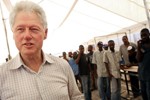
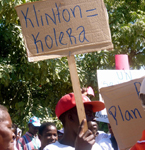
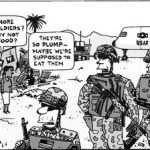
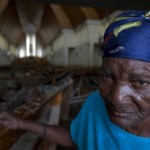

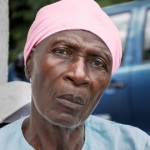
Comments
Haiti: A Six-Month Report Without Cute Baby Pictures or Demands for Aid Money — 1 Comment